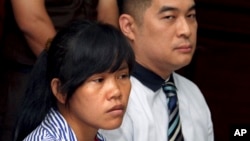Indonesia gave an eleventh hour reprieve this week to a Philippine national who was supposed to be executed for smuggling drugs into that country. Supporters say Mary Jane Veloso was a victim of human trafficking, forced to work as a drug courier.
Now that Mary Jane Veloso has been temporarily spared the firing squad, she is expected to testify against an alleged job recruiter whom she says set her up to unknowingly smuggle heroin into Indonesia. But the road that led to this point in her life has been riddled with difficulties.
Attorneys with the National Union of People’s Lawyers say Veloso first worked overseas in 2009 as a domestic helper in the Middle East. But she did not complete her contract because the employer tried to rape her and physically abused her.
With the contract unfinished, she returned to her in-law’s home in Cabanatuan City in the northern province of Nueva Ecija. For a year, Veloso, who only studied through the first year of secondary school, tried to make a go of peddling plastic containers in nearby neighborhoods. The business failed.
Attorney Edre Olalia says in Veloso's desperation to find work to help support her two sons, she accepted an offer from her god sister to work as a maid in Kuala Lumpur. But he said that at the urging of her godsister, Veloso ended up in Yogyakarta -- with a suitcase that the godsister’s friend gave her, containing 2.6 kilograms of heroin hidden behind the lining. Indonesian authorities arrested her in April 2010 and six months later convicted and sentenced her to death.
Olalia says about a month before she was scheduled for execution on April 28 he had trouble sleeping.
“I was imagining how she might have felt being alone and in a far away place from home, neglected by her government and about to be killed by musketry for something that she had not done,” said Olalia.
Olalia offered to help the Manila-based overseas workers’ advocacy group Migrante International, which had taken up the 30-year-old Veloso’s cause.
Veloso, the daughter of a contractual sugar plantation worker, has maintained her innocence. She has consistently reiterated that Maria Kristina Sergio, the godsister, deceived her.
Migrante International Deputy Secretary General Mic Catuira calls Veloso’s case human trafficking and “quite special” when compared to those of other death row convicts the organization has campaigned for.
“Because from the statements and from our investigation we saw that she was really innocent of all the accusations made against her. So she really does not deserve the death penalty,” said Catuira.
Catuira also said the government “failed her” because it did not act until after Migrante investigated two months ago.
The Philippine government says it worked hard to do all it could for Veloso. Throughout the years of Veloso’s detention the Philippines asked that her life be spared in letters sent to the Indonesian government and meetings with Indonesian authorities.
The government filed a first appeal in March saying Veloso had questionable translations of court proceedings. Her advocates say she does not speak English and needed to have Bahasa Indonesia translated to her native Tagalog. The Indonesian Supreme Court rejected the appeal. Then last week Indonesia rejected a second appeal on grounds that only a single appeal is allowed.
The Philippine law enforcement investigators looked into Veloso’s affidavit naming Maria Kristina Sergio as her illegal recruiter and this week filed illegal recruitment, human trafficking and defrauding charges. On the day of the expected execution Sergio turned herself in to authorities, seeking protection from death threats but denying any wrongdoing.
Philippine Cabinet Secretary Jose Renee Almendras says this prompted President Benigno Aquino to again speak with Indonesian President Joko Widodo. Aquino conveyed Sergio’s charges and surrender and said Veloso was needed as a witness in the case against her. Indonesian officials say their attorney general stayed the execution citing Aquino’s plea. Almendras says the Philippine government is grateful the approach worked.
“We all acknowledge the fact that Mary Jane’s situation is very different because she was a victim of circumstance, her experience in Saudi and all this. The desperation that she had was very different,” said Almendras.
The Philippines is one of the top five countries that send workers overseas. Government statistics show ten percent of the population live abroad and about half are contract workers.
Migrante says those numbers are lower than its estimates and do not account for illegal workers, which it says are 20 percent of the overseas population.
Migrante’s Catuira says prospects of getting work overseas quickly by skipping layers of bureaucracy attract people desperate for employment. This also makes them targets for human trafficking.
The Philippine Overseas Employment Administration regularly warns against going to illegal recruiters and pushes prospective workers to deal only with agencies registered with the government. Its latest warning, dated April 27, is an alert against becoming an unwitting victim of drug trafficking.




